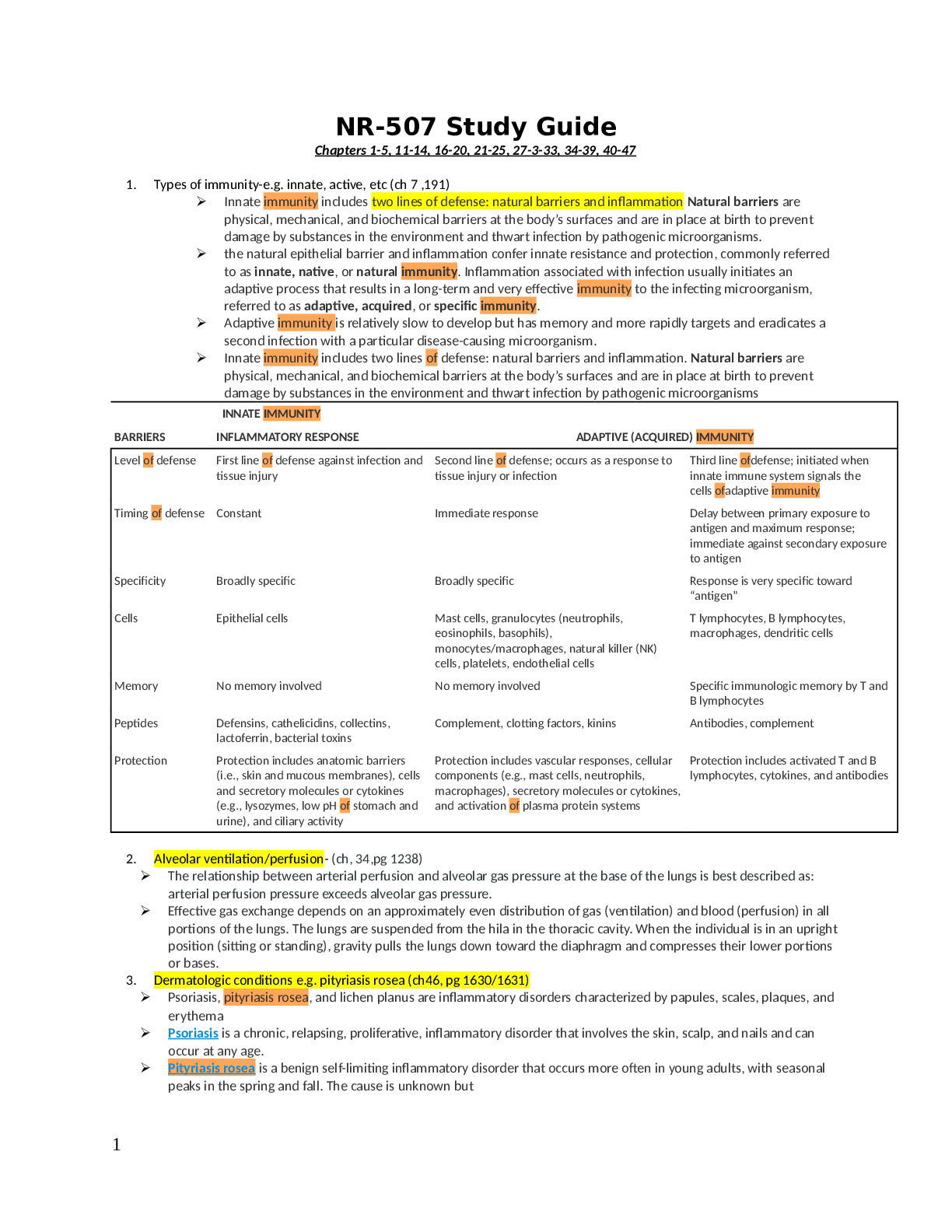1.
Types of immunity-e.g.innate, active, etc (ch 7 ,191)
Innate immunity includes two lines of defense: natural barriers and inflammation Natural barriers are
physical, mechanical, and biochemical barriers at the body’s surfaces and are in place at birth to prevent
damage by substances in the environment and thwart infection by pathogenic microorganisms.
the natural epithelial barrier and inflammation confer innate resistance and protection, commonly referred
to as innate, native, or natural immunity. Inflammation associated with infection usually initiates an
adaptive process that results in a long-term and very effective immunity to the infecting microorganism,
referred to as adaptive, acquired, or specific immunity.
Adaptive immunity is relatively slow to develop but has memory and more rapidly targets and eradicates a
second infection with a particular disease-causing microorganism.
Innate immunity includes two lines of defense: natural barriers and inflammation. Natural barriers are
physical, mechanical, and biochemical barriers at the body’s surfaces and are in place at birth to prevent
damage by substances in the environment and thwart infection by pathogenic microorganisms
INNATE IMMUNITY
BARRIERS
INFLAMMATORY RESPONSE
ADAPTIVE (ACQUIRED) IMMUNITY
Level of defense
First line of defense against infection andtissue injury
Second line of defense; occurs as a response to
tissue injury or infection
Third line ofdefense; initiated when
innate immune system signals the
cells ofadaptive immunity
Timing of defenseSpecificity
Constant
Broadly specific
Immediate response
Broadly specific
Delay between primary exposure to
antigen and maximum response;
immediate against secondary exposure
to antigen
Response is very specific toward
“antigen”
Cells
Memory
Peptides
Protection
Epithelial cells
No memory involved
Defensins, cathelicidins, collectins,
lactoferrin, bacterial toxins
Protection includes anatomic barriers
(i.e., skin and mucous membranes), cells
and secretory molecules or cytokines
(e.g., lysozymes, low pH of stomach and
urine), and ciliary activity
Mast cells, granulocytes (neutrophils,
eosinophils, basophils),
monocytes/macrophages, natural killer (NK)
cells, platelets, endothelial cells
No memory involved
Complement, clotting factors, kinins
T lymphocytes, B lymphocytes,
macrophages, dendritic cells
Specific immunologic memory by T and
B lymphocytes
Antibodies, complement
Protection includes vascular responses, cellularcomponents (e.g., mast cells, neutrophils,
macrophages), secretory molecules or cytokines,
and activation of plasma protein systems
Protection includes activated T and B
lymphocytes, cytokines, and antibodies
2.
Alveolar ventilation/perfusion- (ch, 34,pg 1238)
The relationship between arterial perfusion and alveolar gas pressure at the base of the lungs is best described as:
arterial perfusion pressure exceeds alveolar gas pressure.
Effective gas exchange depends on an approximately even distribution of gas (ventilation) and blood (perfusion) in all
portions of the lungs. The lungs are suspended from the hila in the thoracic cavity. When the individual is in an upright
position (sitting or standing), gravity pulls the lungs down toward the diaphragm and compresses their lower portions
or bases.
3. Dermatologic conditions e.g. pityriasis rosea (ch46, pg 1630/1631)
Psoriasis, pityriasis rosea, and lichen planus are inflammatory disorders characterized by papules, scales, plaques, and
erythema
Psoriasis is a chronic, relapsing, proliferative, inflammatory disorder that involves the skin, scalp, and nails and can
occur at any age.
Pityriasis rosea is a benign self-limiting inflammatory disorder that occurs more often in young adults, with seasonal
peaks in the spring and fall. The cause is unknown but
1
Read More


